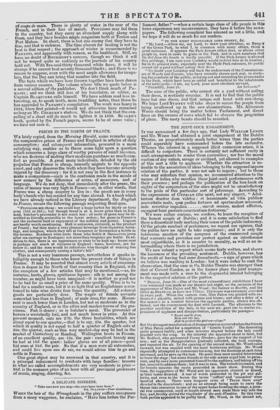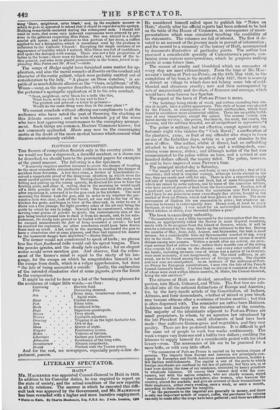THE JOINT-SOCK ENGAGEMENT.
IT was announced a few days ago, that Lady WILLIAM LENOX and Mr. Wool) had obtained a joint engagement at the Dublin Theatre, on proportionately much better terms than the parties could separately have commanded before the late esclandre. Whence the interest in a supposed illicit connexion arises, it is difficult to conjecture. There is certainly not sufficient rarity in such arrangements to render them curiosities ' • nor has the moral custom of any nation, savage or civilized, yet allowed to examples of this sort a title to applause. Whether the attraction is re- ferable to the association of ideas belonging to the supposed impure relation of the parties, it were not safe to inquire • but to those who may. entertain that opinion, we recommend attention to the names of ladies who sanction these joint-sock performances with their presence ; and perhaps the publication of the box-book on nights of the conjunction of the stars might not be unsatisfactory to the pride of this particular sort of patronage. According to the expressions of CYPRIAN (the saint, not any singer), " Adul- terium discitur dum videtur ; et lenocinante ad vitia publicm auctoritatis malo, gum pudica fortasse ad spectaculum acesserat, inde revertitur impudica movet sensus, muket affectus, expugnat boni pectoris conscientiam fortiorem." We were rather curious, we confess, to learn the reception of the honest couple at Dublin ; and it is some satisfaction to find there a dissentient body marking their sense of the public indecency. Of the private conduct of performers, we repeat our opinion, that the public have no right to take cognizance ; and it is only the boisterous sanction of the congress of the enamoured couple that warrants and provokes our protest against an interference most unjustifiable, as it is counter to morality, as well as an in- termeddling where there is no jurisdiction. We now submit a report which seems fairly written, and shows the looseness of the prevailing sentiment. Dublin, however, has the credit of having had some dissentients,—a sign of grace which we believe was wanting in London : but it were unfair to omit the observation, that the case in the Dublin Theatre was stronger than that of Covent Garden, as in the former place the joint engage- ment was made with a view to the disgraceful interest belonging to the suspected relation of the parties.
"DUBLIN, June 20.—One of the most extraordinary exhibitions I have ever witnessed was made at our theatre last night, on the occasion of the appearance of Miss Paton and Mr. 'Wood ; the former as Rosetta, and the latter as Hawthorn, in Love in a Pillage. The house was extremely crov.-ded in every part. When the curtain rose, Miss Paton was greeted with en- thusiastic plaudits, mixed with groans and hisses ; and after a delay of a few minutes in a contest between the opposite parties, silence was ob- tained, and she commenced the duet with Lucinda. The allusions to the peculiar condition of the lady, in the next air, gave rise to similar ex- pressions of applause and disapprobation, particularly the passage- " Resist and be free,
Ran riot like me.
And to perfect the picture—elope."
But th e strongest manifestation of disapprobation occurredwhen the friends of Miss Paton called for a repetition of 'Gentle Youth.' The dissenting party groaned lustily, and some minutes elapsed before the lady could proceed with the song. In the interval she appeared about to faint, but Mr. Bedford, who personated Young Meadows, gave her the support of his arm ; and as the disapprobation gradually subsided, she took courage, and repeated the air. In the opening of the second scene, Mr. Wood came forward, but was assailed with the most boisterous yellings. Mr. Wood repeatedly attempted to commence his song, but the hootings at each time increased, and he gave up the task. He more than once seemed determined to leave the stage ; but some friends at the side scenes urged him to perse- vere, and he once more presented himself to the auditory, and taking off his hat, essayed to address them ; but it was in vain. The tumult increased, and for twenty minutes the opera proceeded in dumb show. During this time, the supporters of Mr. Wood and his opponents cheered or hissed, as their tastes directed. A war of words proceeded in the pit and gal- leries, and even in the boxes the terms ruffian' and scoundrel' were bandied about. There were frequent cries of 'Throw them over' directed to the dissentients : and on an attempt being made to carry the threat into execution in one of the upper boxes fronting the stage, a gene- ral row commenced, until at length several men made their way into the box, and forcibly ejected the ringleader of the anti-Woodites. By this time both parties appeared to be pretty tired. Mr. Wood, in the second act, Sang Clone, neighbour, ne'er blush,' and, by the emphatic manner in
•
which he gove ii, appeared to intend that it should be regarded as his apology. -Nothing remarkable occurred during the subsequent acts. I should not omit to state, that some.very indecent expressions were uttered by per- sons in thegalleries respecting Miss Paton. . She was attired in a bright .acarlet silk apron; and in allusion to this portion of her dress, a ruffian 'applied to her a designation which is sometimes used by the profane in reference to the Catholic Church ! Excepting the single instance of an appearance of timidity which I noticed, Miss Paton was full of confidence, and spoke the dialogue with energy. There was not a fair proportion of ladies in the house—there were no females of rank ; but some of the la- dies present, and who were placed prominently in the boxes, joined in ap- plauding Miss Paton and Mr. Wood."—Globe.
The songs of Hodge might have furnished some matter for ap- -plication, and also the moral remarks of Rosetta on the conduct and 'character of the rustic gallant, which were probably omitted out of consideration to the lady. "A plague on these wenches," is ca- pable of as much delicate allusion as the " Oons, neighbour," of Mr. • WOOD—sung, as the reporter describes, with an emphasis marking the performer's apologetic application of it to his own conduct.
" Oons, neighbour, ne'er blush for a trifle like this,
• What harm with my lady to toy and to kiss ? The greatest and gravest—a truce to grimace— Would do the same thing were they in the same place !"
We cannot conclude without offering our compliments to all the audiences who- have acted the part of throwing the stocking on this delicate occasion ; and we wish husbands joy of the wives who have lent approving countenances to the exemplary arrange- ment. Such things are common, Doctors' Commons knows; but not commonly applauded. Macte may now be the encouraging motto at the doors of the more modest houses which conceal what theatres ostentatiously exhibit.



























 Previous page
Previous page